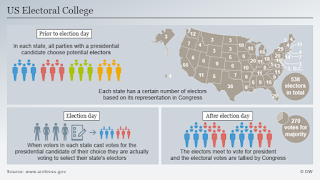Now that the House Judiciary Committee has
approved two impeachment articles against President Trump, and a vote in the full House of Representatives impeaching him appears inevitable, we ask, “What’s next?” The easy
answer – trial in the
Republican-controlled U.S. Senate –
only partly tells the story.
Impeachment could impact the 2020 election (or not). Americans may long debate
this impeachment (or not). This might represent a watershed moment in American
politics (or not). We find looking at the possibilities more intriguing than
reviewing the tedious judiciary committee debate that brought us to this point.
Impeachment and the
Election
Many Democrats who can’t stand Trump resisted
impeachment as long as they did because they saw it negatively affecting the
party’s 2020 chances. This theory found support in public reaction after Attorney General William Barr
exonerated Trump upon
release of the Mueller Report. Barr mischaracterized the Special Counsel’s work, something a lot of people
now understand, but he set the narrative for a good while. In the short term,
Barr’s bad faith spin doctoring set up Trump for spiking the ball and dancing
in the end zone, proclaiming, “No collusion. No obstruction.” It seemed a Senate
vote acquitting Trump after impeachment in the House might produce a repeat and
give him big advantages next November.
 |
| Special Counsel Robert Mueller |
Continuing the football analogy, upon
further review, history doesn’t necessarily support that idea. Bill Clinton’s highest approval ratings followed acquittal in his impeachment trial but, arguably, Clinton'simpeachment
fueled George W. Bush’s victory over Al Gore
in 2000. At the
very
least, it provided Bush a ready-made slogan about “restoring dignity” in the Oval Office, a thinly disguised shot at Clinton for
having sexual relations with an intern in that very office.
 |
| Oval Office |
The impeachment articles against Trump don’t accuse him of
sexual misconduct, but the overwhelming evidence of his malfeasance in
connection with Ukraine lets the attack ads write themselves. Arguments Republicans make
in defending him are as flimsy as crepe paper in a hurricane. Trump should survive
the Senate trial because enough GOP senators won’t defect. The American people may well
play the role of referee and throw a flag for excessive celebration. In truth, only
those long bamboozled by Trump’s act will see acquittal as a reason for voting
for him. Impeachment, therefore, may not much affect the election after all.
The Debate
Many words got thrown around in the seemingly endless
judiciary committee impeachment debate. We lived through the Nixon and Clinton impeachments. This
seemed different and not in a good way. The result, both in the House and
Senate appears so baked in, even political junkies might ask, “Why bother?”
House Democrats answer with the irrefutable contention that
they couldn’t avoid impeaching Trump and still claim they’re protecting and
defending the constitution, as their oaths require. Being lawyers, we get that. Still, we all know how this movie ends. In the absence of an
astounding
development none of us foresee, the House will impeach Trump on a
party line vote with defections by four or five Democrats from districts Trump won,
the Senate will acquit him with the only mystery being how many Republicans
defect. The betting will center on whether a majority of senators vote for conviction,
a possibility, given vulnerable GOP incumbents like Maine’s Susan Collins and Colorado’s Cory Gardner and Trump skeptics like Utah’s Mitt Romney who may join Democrats in voting for
removal.
We fear this impeachment saga will
not produce memorable moments. We won’t see brave, principled House Republicans
bucking their party and voting for impeachment as seven did against
Nixon in
1974. Texas Congresswoman Barbara Jordan isn’t around, proclaiming her faith
in the constitution,
despite its initial mal-treatment of her racial ancestors. In a few months, post
impeachment political discourse probably sounds much like pre-impeachment political
discourse.
An Impeachment Legacy?
What Legacy?
Trump, like Clinton, like Nixon, and
like Andrew Johnson will now have impeachment in the
first
paragraph of his obituary. But, with a president who has lied as much and
committed as many offenses, many of them criminal, how much difference does that
make? Is this a watershed moment in American politics or something else?
We can offer one unpleasant possibility. The legacy of the
Trump impeachment may lie in the fact our hyper partisan politics means the nation can now never remove a president from
office, no matter what that president does wrong. Republican support for Trump,
in the face of overwhelming evidence of his corrupt conduct, suggests we’re
stuck with misbehaving chief executives, no matter their sins. Democrats say
they’d behave differently with the shoe on the other foot, but are we sure?
Unless the opposition party holds 60
plus Senate seats, an improbability if not an
impossibility, no
president gets removed. It won’t happen unless the country so
turns against the president, senators of that president’s party believe they
will pay a higher political price for loyalty than turning the other way.
This situation, therefore, presents troubling questions
for American democracy. Have we reached a point at which only elections can
remove renegade presidents? Can a president with a loyal, dedicated base really shoot someone on Fifth
Avenue in New York and get away with it? Do people so badly want their guy or
gal in office that nothing else matters? Perhaps that’s this impeachment’s
legacy, a discomforting thought, but maybe where we are.
















